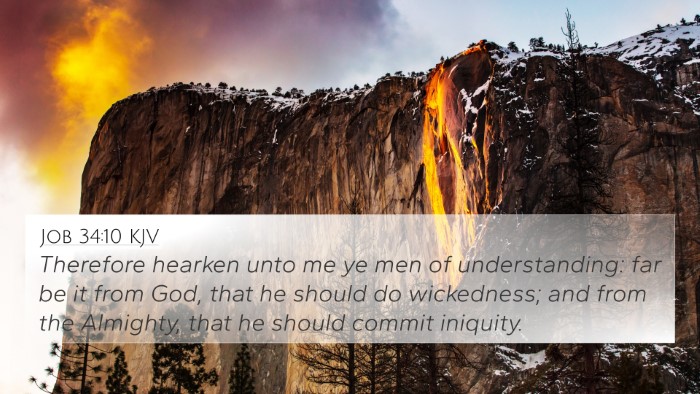Old Testament
Genesis Exodus Leviticus Numbers Deuteronomy Joshua Judges Ruth 1 Samuel 2 Samuel 1 Kings 2 Kings 1 Chronicles 2 Chronicles Ezra Nehemiah Esther Job Psalms Proverbs Ecclesiastes Song of Solomon Isaiah Jeremiah Lamentations Ezekiel Daniel Hosea Joel Amos Obadiah Jonah Micah Nahum Habakkuk Zephaniah Haggai Zechariah MalachiJob 1:22 Similar Verses
Job 1:22 Cross References
In all this Job sinned not, nor charged God foolishly.
Uncover the Rich Themes and Topics of This Bible Verse
Listed below are the Bible themes associated with Job 1:22. We invite you to explore each theme to gain deeper insights into the Scriptures.
Job 1:22 Cross Reference Verses
This section features a detailed cross-reference designed to enrich your understanding of the Scriptures. Below, you will find carefully selected verses that echo the themes and teachings related to Job 1:22 KJV. Click on any image to explore detailed analyses of related Bible verses and uncover deeper theological insights.

Job 2:10 (KJV) »
But he said unto her, Thou speakest as one of the foolish women speaketh. What? shall we receive good at the hand of God, and shall we not receive evil? In all this did not Job sin with his lips.

James 1:12 (KJV) »
Blessed is the man that endureth temptation: for when he is tried, he shall receive the crown of life, which the Lord hath promised to them that love him.

Romans 9:20 (KJV) »
Nay but, O man, who art thou that repliest against God? Shall the thing formed say to him that formed it, Why hast thou made me thus?

James 1:4 (KJV) »
But let patience have her perfect work, that ye may be perfect and entire, wanting nothing.

1 Peter 1:7 (KJV) »
That the trial of your faith, being much more precious than of gold that perisheth, though it be tried with fire, might be found unto praise and honour and glory at the appearing of Jesus Christ:

Job 34:10 (KJV) »
Therefore hearken unto me ye men of understanding: far be it from God, that he should do wickedness; and from the Almighty, that he should commit iniquity.
Job 1:22 Verse Analysis and Similar Verses
Understanding Job 1:22
Job 1:22: "In all this Job did not sin by charging God with wrongdoing."
Meaning and Analysis
The verse encapsulates a profound moment in the narrative of Job, exemplifying his piety and unwavering faith amidst unimaginable trials. Job loses his wealth, his children, and his health, yet this passage emphasizes his refusal to accuse God of injustice.
Matthew Henry notes that Job's reaction is a model of integrity, stressing that true faith is manifested not in the abundance of blessings but in the steadfastness of spirit through suffering. He highlights Job's understanding that God's ways are beyond human comprehension, thereby illustrating a foundational theme of the Book of Job: the concept of theodicy—justifying God's goodness in the face of evil.
Albert Barnes offers insight into Job's character, suggesting that his lack of sin is related to his recognition of God's sovereignty and goodness. Job's ability to remain silent in his anguish speaks volumes about his relationship with God; he refrains from blaming God, which reflects a profound theological understanding that God is ultimately in control, regardless of human circumstances.
Adam Clarke expands upon this, arguing that Job's response represents a depth of faith that becomes a significant teaching point for believers. Clarke emphasizes that in every trial and tribulation, one must maintain a correct perspective on God, which Job exemplified remarkably. His refusal to 'charge God' signifies an acknowledgment of God’s overarching plan—even when that plan leads through valleys of despair.
Biblical Cross-References
- James 1:12 - "Blessed is the man who perseveres under trial..." - This verse parallels Job's endurance and faithfulness in suffering.
- Psalms 44:22 - "For your sake we face death all day long; we are considered as sheep to be slaughtered." - Reflects similar themes of suffering for God's sake.
- Romans 8:28 - "And we know that in all things God works for the good of those who love him..." - Aligns with Job's understanding of God's ultimate plans for good.
- Proverbs 3:5-6 - "Trust in the Lord with all your heart and lean not on your own understanding..." - Connects Job's faith with trusting God's wisdom.
- Isaiah 55:8-9 - "For my thoughts are not your thoughts, neither are your ways my ways..." - A significant reminder of the divine perspective over human trials.
- 1 Peter 1:6-7 - "In all this you greatly rejoice, though now for a little while you may have had to suffer grief..." - Affirms the idea of rejoicing through trials, akin to Job’s experience.
- 2 Corinthians 12:9 - "But he said to me, 'My grace is sufficient for you, for my power is made perfect in weakness...'" - Mirrors the sufficiency of God during Job's weakest moments.
Thematic Connections
This verse highlights several themes significant to both the Book of Job and the broader Biblical text:
- The Innocence of Suffering: Job's story is often cited in discussions about why good people suffer, finding connections in other texts.
- The Nature of Faith: How is faith defined and tested? Job's experience prompts readers to examine their own faith dynamics.
- God's Sovereignty: A key concept throughout Scripture; Job's refusal to sin emphasizes God's complete authority.
- Endurance and Perseverance: Job's trials resonate with various passages encouraging believers to endure through hardship.
Cross-Referencing and Study Tools
Utilizing tools for Bible cross-referencing can enrich one's understanding of scripture. Here are several resources:
- Bible Concordance: A reference tool that helps locate Bible verses related to specific themes or words.
- Bible Cross-Reference Guide: A systematic way to find related verses for deeper study.
- Cross-Reference Bible Study: Methods that promote understanding of scripture through thematic connections.
- Bible Reference Resources: Collections of study tools aiding in exploring Biblical text links.
Conclusion
Job 1:22 serves as a profound statement about faith and resilience. By refusing to blame God, Job models a biblical principle that has resonated with believers through centuries. Cross-referencing this verse with others deepens understanding and inspires spiritual growth, fostering a robust discussion about the nature of faith, suffering, and the goodness of God in every trial.




